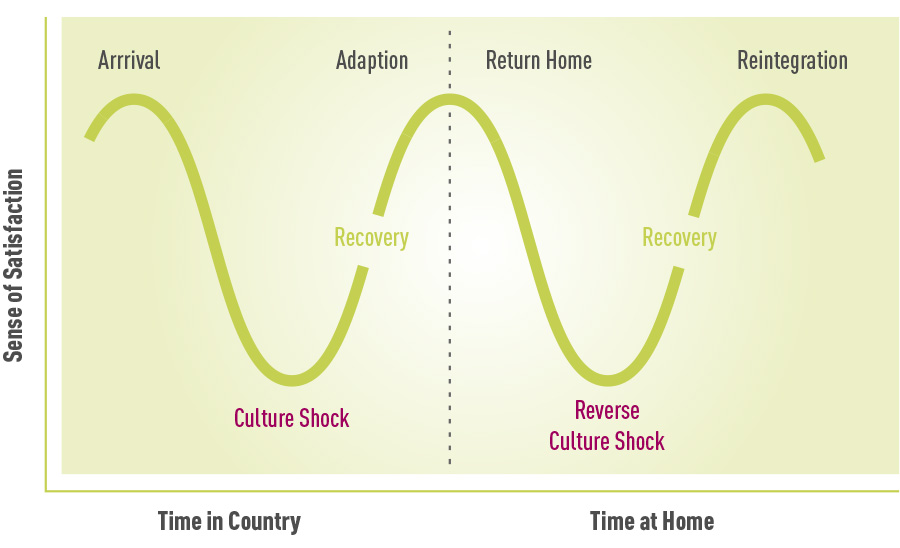Culture Shock
Everyone should be aware that Culture Shock is inevitable when you move to a new country. In reality, this happens to anyone who moves to a new place, to Americans and international students alike, whether you are moving to a different country or new state or city. Everyone will undergo the various adjustment phases; the typical adjustment phases look like this U curve (the first half of the W graph).

These are the four phases of adjustment, and the culture shock phase might seem more acute in a new country because you are dealing with a completely different culture. Even if your native language is the same as your host culture’s, there are hidden aspects of the culture that you might not realize until after awhile.
Honeymoon phase: Everything seems new and exciting. This can last a few days to a few weeks or even more.
Culture Shock: Inevitably, you will start to feel confused, misunderstood, and frustrated with this new culture, and you may start to feel homesick. This is when you know you have entered the Culture Shock phase. It is normal to feel sad or even depressed for a few weeks, or even longer. If this feeling persists beyond a month or more, however, there is nothing wrong with talking with a professional about it.
Recovery: Eventually, people will start to recover from their culture shock (although it’s possible they can go back and forth between stages two and three for awhile). People will start to re-adjust to their new environment
Adaptation: Not everyone reaches this stage, but the longer you are in a new country, the more likely you will adapt, and you might even adopt some of this new culture into your home culture. In this way, you might always have a part of this new culture with you, which those at home may not understand when you return.
Tips for Surviving the Adjustment Process
- Get Connected: It’s important to avoid isolation and have social support. Connect with people from your home country and in the local community.
- Be open to new experiences and try to understand this new culture. Just by choosing to live and study in a new country, you are already open to new experiences and cultures. Allow your curiosity to flourish. Look for a cultural informant–someone who can help you understand this new culture! This cultural informant could be an American, or it could be a fellow international student.
- Speak English as much as possible, if it’s not your native language. Don’t be afraid to make mistakes — your English doesn’t have to be perfect!
- Suspend judgement on things that are new — they may be different than you are used to, but they are not necessarily “good” or “bad”.
Reverse Culture Shock
The second half of this W curve shows the similar ups and downs of Culture Shock when you return to where your family lives. In this way, you may encounter similar emotions and feelings when you return to your home culture and experience “Reverse Culture Shock” or “Re-entry Shock.” Sometimes, this may feel more difficult because you do not expect to feel these emotions about being back “home.” This reaction is more likely the longer you have been away and the more you have adapted to the new culture (or your “host culture.”) Eventually, however, just like with any adjustment phase, you should recover and re-integrate into your home culture, even though you may feel like you have changed. Again, all of these feelings and emotions are a normal reaction to moving to a new place and then returning to your home culture.


